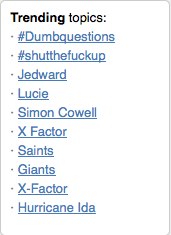On Twitter, trending topics offer a glimpse into the behavior and common interests of everyday users – as governed by time and attention. Prevailing themes represent the culmination of popular focal points that unveil characteristics of varying groups of users that transform and scale with events and trends.
The question is, do trending topics symbolize the topics that are relevant to you?
If trending topics collectively represent the state of conversations on Twitter, then perhaps “the wisdom of the crowds” doesn’t necessarily reflect the topics that might interest the disparate groups that form Twitter’s diverse community.
At the time of this post, Trending Topics included:

Trending topics and those driving their percolation contribute to their manifestation. Sometimes, many of us take to Twitter to share what has captured our interests or attention prior to realizing that they are also shared by many others within the community. But many times, the themes that capture the attention of those to whom we’re connected, don’t always make it onto our attention dashboard.
At the very least, Trending Topics create real-world “Conversational Networks” that allow us to study and graph user behavior, profiles, and the contextual lineages between people representing disparate groups of age, gender, and backgrounds. But when it comes to channeling relevant trends that match the interests of specific users, Trending Topics continue to fall victim to the noise that may threaten to pollute the very thought streams that serve as the lifeblood for Twitter itself. While Lists help to some extent, we can only benefit from a layer of intelligent filtering integrated into the stream to further personalize and improve the experience – not unlike what FeedHub and AideRSS attempted to do for RSS feeds.
As a result, Twitter is now taking a proactive role in filtering trends and evaluating what’s spam and what’s genuine as it struggles to reverse the downward trend in visitors to Twitter.com.
According to a recent post on Twitter’s blog:
We’re starting to experiment with improvements to trends that will help you find more relevant tweets. Specifically, we’re working to show higher quality results for trend queries by returning tweets that are more useful. The improvement won’t be very noticeable at first, but this is a small step toward unearthing more value in search and getting you more relevant results.
UPDATED
Connect with Brian Solis on:
Twitter, FriendFeed, LinkedIn, Tumblr, Plaxo, Posterous, or Facebook
—
Click the image below to buy:







![While AI learns and gets smarter and smarter, I spend my time preparing for the future by… [fill in the blank].
The most important skills of the future are human…
#creativity, #imagination, #individuality, #criticalthinking, #empathy
bit.ly/LifescaleBook 💫
Artist: @asiersanznieto
#promptengineering #prompting #ai #genai #artificialintelligence #keynotespeaker #motivationalspeaker #motivational #motivation #education #learning #leadership #leader](https://briansolis.com/wp-content/plugins/instagram-feed/img/placeholder.png)
An interesting post that I think raises a number of questions, my main two being:
Who should be the judge of relevant conversation?
Why should the voice of the masses be ignored for the voice of the few?
Perhaps the question lies in the future of the semantic web. Perhaps we become the judge of what we see in our stream as well as the topics that have bearing to us individually….
I think they're immature too, but Twitter should be very careful in putting roadblocks in front of popular uses of Twitter. It's not possible to predict the future, so limiting what people want to do is not necessarily a good idea.
That said, I think Twitter is going to focus more on blocking spammers from piggybacking on trending topics than changing the topics themselves. “Improvement to trends…more relevant tweets” sounds like fitting the tweets better to the trends, not fitting the trends to something.
I think you're right…although, I've heard that we will actually have filtering options soon, through third parties, that mirror our interactivity within our own streams. That might be the better way to ensure that Twitter remains personal…and that no one “tells” us what is important and that it remains highly personal. Who am I to say what is important to you, but at the same time, I need Twitter to also deliver value in addition to the tweets of those whom I follow, through a greater reflection of the interests of those I follow and those they also follow.
Obnoxiously elitist and small minded of you, Brian. So you don't like the trending topics – most likely REAL topics that REAL people talk about – so Twitter and trending topics must be immature.
Fail to see the logic there, but nice fumble (to use an analogy that fits in with the Packers, Giants and Bucs … so is germane to the trending topics today).
Obnoxious, elitist, small minded leading to a fumble? Certainly not what is supposed to be driving the intention of the post… Did the idea get communicated as well as it was supposed to? Maybe not. So, per your comment, I just revisited the post and hopefully clarified the state of trends as it relates to the individual experience.
My turn now 🙂
Your post sort of assumes there is intelligent life out there and it all lives on twitter, or will one day. I think, and this is just me, we have to remember what regular people talk about. Of course we also have to take into consideration the sorts of people who mostly talk on the web in social networks. A lot of what we all see in trending topics is who won the oscar, what artist won the grammy, which phone rocks, what the price of a netbook is and so on.
None of this takes away from the deeper conversation that also takes place, but it is general conversation. More people are aware when it's oscar time. More people are aware of new gadgets that come out. The important conversation is more subjective. It doesn't stream the same way – it's flow is interrupted by the massive amount of social influence. An example of this would be what was just a headline on the LA Times. Was it about homelessness? Nope. The current state of the world economy? No again. Was it about healthcare reform? Absolutely not. It was about banning the practice of de-clawing cats. Headlines aren't about important things. headlines are about what sells papers or gets attention.
Well said Sheryl, the same level of filtering and individualization required on Twitter could also benefit what you see when visiting the LA Times for example. In the case of twitter's involvement, I'm sure it'll focus on spam vs. censorship…some of the trending topics that have appeared in the past have been the results of paid and also intentional campaigns.
no doubt this is going to improve. Datamining has to be at the top of list for Twitter and vendors looking for income
I don't find it elitist at all. What's obnoxious is the noise. I'd love to see Twitter create a feature that let's you see the trending topics within select lists/groups/followers who you are interested in. Hence filtering the noise and allowing for discovery of topics from people who interest you. But I certainly think they should keep the main trending topics of all users, even if the masses like “immature” and other topics that may not interest some.
Surely if you do anything other than mildly edit the trending topics list (ie group related topics, remove spam) then the list isn't really trending topics. The users will begin complaining about the curation, as they did with the suggested user list.
Perhaps trending topics would be more relevant if it were created from your connections but it would make the twitter community a little more insular. I thought social media was supposed to be about expanding your community.
Thanks for the post Brian. I like the idea of spam disappearing from trending topics (which I rarely look at anymore), but I think manually censoring it isn't the right way to go about it (gatekeepers 2.0).
Miiko brings up a great point. I think that trending topics qualified by lists would be much more interesting.
This debate is a really important one. Despite the ‘noise’, to date Twitter’s real social impact has been determined by the largely liberal-minded, educated, and socially aware early adopters. What happens when these voices are lost not simply in trivia, but in cries of intolerance, extremism, and spite? Actor Stephen Fry, the UK’s most famous user of Twitter, reflected on this dilemma recently in his blog ‘Poles, Politeness and Politics in the age of Twitter’ http://bit.ly/44dq8X:
'Twitter may seem to some to be dominated by bien pensant, liberal spirits at the moment. Will I be so optimistic about it when these spirits are matched by forces of religiosity and nationalism that might not accord with my chattering-class, liberal elite preferences? When the political machines march in and start recruiting and acquiring millions of followers, giving them the power to close sites with DDOS slashdotting campaigns, what will I say then?'
I think you may have jumped to a very unscientific conclusion based on the time slice your trending topics summary is generated from. It is Sunday, a day of rest…and American football. Most of the heavyweight, high value tweeters are with their families, spouses, doing Sunday stuff. Many are spending mindless hours watching highly paid 'professionals' annihilating each other in a quest to get a piece of inflated leather over a line, and then tweeting. Meanwhile, Arrington outs Pincus and scamgate and gets the word out via Twitter. Not so immature when you peel back the layers….
Peter, I've grabbed trending topics at various points of time and day over the lifespan of trending topics. As a whole, many argue that trends do not reflect that of their personal interests. The case can be made for filtering to deliver a more meaningful and personal experience.
No doubt. There are many directions this thread can take. Twitter is a very diverse platform but for me a very valuable business tool. For many, it is a toy. I would certainly like to see a filtered or targeted trending feature that is more relevant to me.
Define immaturity. Are the ~36,000 people and organizations who follow you on Twitter and allegedly tweet themselves considered immature? Or is immature tweeting brought about by the fans who followed Ashton Kutcher and Oprah to Twitter?
Considering the average Twitter user follows 7 people and tweets, literally, what they are doing; are they immature or are you defining them based on some pseudo-advanced culture you've progressed to?
Ari, I had to update the post to make sure that the case for personal filtering was communicated…
“While Lists help to some extent, we can only benefit from a layer of intelligent filtering integrated into our stream to further personalize and improve the experience – not unlike what FeedHub and AideRSS attempted to do for RSS feeds.”
Brian, I think that's a good idea, using something like topsy.com, bit.ly or Tweetmeme to better filter trending topics based on what what links I have shared on twitter before using api calls. I really think it's time for twitter to kill the trending topics or change it all together.
We may well be seeing more apps that help us discover what topics are trending among our specific networks. I've been taking a a look at TwitterTim.es, for instance, which creates a “newspaper” of the stories being most retweeted by your particular followers (http://www.twittertim.es/).
Twitter is a medium that allows for discussion…of all types. If a Trending Topic arises people are obviously feeling the need to join the conversation. While most “trending topics” are pollution, some prove to be timely and topical. Twitter also holds the ability to serve as a news medium for some users. I do think for Twitter's credibility it is in their best interest to filter things like Trending Topics to rid the spam or nonsense.
Trending topics on Twitter were immediately set upon by real spammers (as they will with anything),
but also with hashtag spam by many ignorant and lewd individuals.
I was yet stunned by the number of people who have no reticence to publicly
post filth with their name on it.
The problem has become exponentially worse (literally),
since the mass arrival of MySpace users in recent weeks and months.
To be honest, I've never seen a whole lot of usefulness in the Trending Topics. I always glance at them briefly, but most of the time nothing catches my eye. As one who is actively attempting to land my first gig in PR, I look at them from a professional level as well, and still can't figure much use for them. It's interesting to know what people are talking, thinking about certainly. But the “topics” (used loosely because of the noted spam and intentional campaigns that are influencing the list) change so rapidly that from a PR standpoint, there isn't much you can point to of any real significance.
As soon as you go “ooh, people are talking about X. That's interesting.” X changes to Y and is gone. T
The last real significant trending topic was the Iran situation.
Sometimes the trending topics go in line what I care about and sometimes they don't. Not things like the #shutthefuckup trend I generally have no interest in. But when it comes to a TV or something sports related trending I do care.
Very smart stuff. As information drifts toward popularity in a mainstream setting, there seems to be an increased need to provide some editorial oversight. Twitter seems to be experimenting with this at the right time, as its usage among organizations has seem a 775 percent increase in bandwidth usage.
Best,
Rich
Your example of Trending Topics at the time you wrote this post is a great reminder that the Twitterverse is, in some ways, just as unfortunately reflective of broader society as TV viewership, radio listenership, etc. etc. That is, we have our healthy share of idiots.
While I can see the value of some selective filtering, what I'd really like to see would be trending topics within the people that I follow. This screens out much of what isn't important to me and tells me what the people I actually care about listening to are talking about. Perhaps a toggle or option between different types of trending topic categorizations (All Twitter, All Following, By List…) would be a future direction.
I'm not interested at all in Trending Topics – my crowd talks mostly about work on Twitter. I *am* very interested in Trending Topics for my followers & the people I follow. Our niche will never be big enough to show up on the general list, though, so it's useless to e.
I'm not interested at all in Trending Topics – my crowd talks mostly about work on Twitter. I *am* very interested in Trending Topics for my followers & the people I follow. Our niche will never be big enough to show up on the general list, though, so it's useless to e.
Sometimes, when the bag gucci on display will catch your fancy simply because it is “cute gucci womens shoes. http://www.gucciwell.com
very bad
Your example of Trending Topics at the time you wrote this post is a great reminder that the Twitterverse is, in some ways, just as unfortunately reflective of broader society as TV viewership, radio listenership, etc. etc. That is, we have our healthy share of idiots